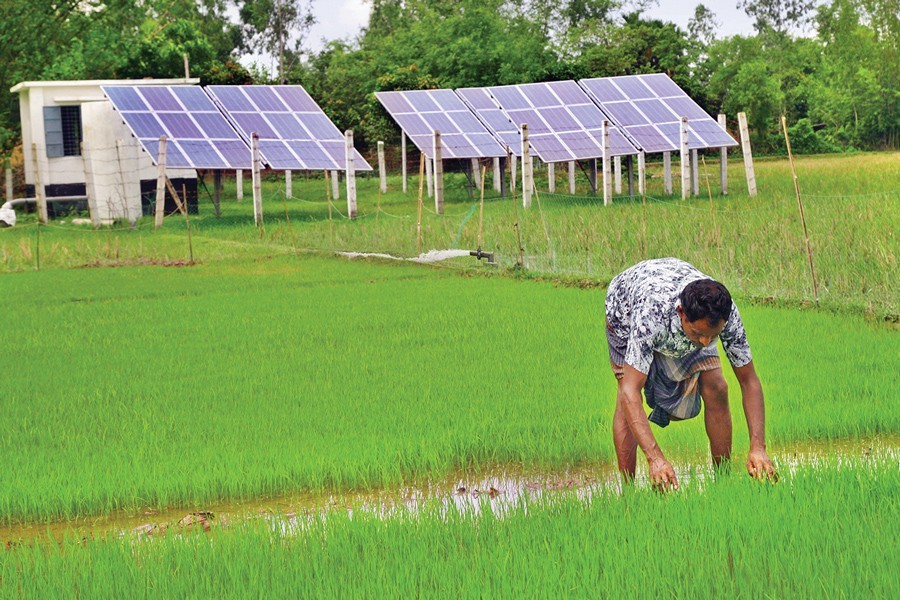The use of solar energy for irrigation has been gaining ground among farmers, especially in off-grid areas, due to the system's low operation and maintenance cost.
Irrigation pumps run by solar power are easy to install and farmers do not need to be present during irrigation of their lands, as the pump is maintained by an operator on community basis.
Moreover, this environment-friendly irrigation solution costs about 45 per cent less than traditional diesel-fired pumps.
A farmer can irrigate an acre of land with solar pump in one season spending only Tk 7,000, whereas the cost will go up to Tk 12,000 to Tk 13,000 if diesel pumps are used.
Farmers of Badarganj upazila of Rangpur are making most of the solar power irrigation programme implemented by the state-run Infrastructure Development Company Limited (IDCOL).
The company has been implementing the programme through its partner organisations across the country.
Until now, IDCOL has approved 1,119 solar irrigation pumps, 925 of which are already in operation and the installation process for the remaining ones is underway.
A single pump can supply up to 1.5 to 2.0 million litres of water a day, enough to irrigate 33 acres of paddy fields or 1815 acres of lands for cultivation of vegetables a season.
Considering its popularity among the farmers, IDCOL has set a target to install 50,000 solar pumps by 2025, replacing 200,000 to 250,000 diesel-run pumps.
IDCOL executive director and CEO Mahmood Malik said, "IDCOL has realised the importance of harnessing the alternative energy sources for irrigation with a view to ensuring food and energy security in the country."
This has led IDCOL to initiate a pilot project in 2013 to set up 1500 solar pumps by 2018, he said.
These solar pumps have a larger capacity and one pump can be used in place of four or five conventional pumps, he said.
With solar pump, a farmer can irrigate an acre of land at a cost of Tk 7,000 to Tk 7,500 in Boro season, but irrigation through conventional pumps will cost him Tk 13,000 to Tk 14,500 depending on fuel price, he added.
Besides, as these pumps are operated by a designated person, farmers do not need to get involved in irrigation management, thereby having more free time when they can be engaged in other income-generating activities, said the IDCOL CEO.
Solargao Limited, a partner organisation of IDCOL, has installed 361 solar pumps in Rangpur, Dinajpur, Panchagarh and Thakurgaon districts.
Talking to the FE, its director (operations) Shamsul Alam Swapan said 40 to 50 farmers can benefit from a solar pump of 11KW capacity as it can irrigate nearly 30 acres of land.
A pump can run for six to seven hours at a stretch and work even in low light, he said.
Saiful Islam, a beneficiary of Purba Dhulua village in Badarganj, said, "Previously we have to wait for days for the shallow machine (diesel pump) as it served the farmers one by one in turn. And sometimes our paddy got destroyed for lack of irrigation in time."
"Now, the solar pump operator irrigate paddy fields from time to time. We don't even need to come to the fields for it," he added.
Farmer Md Shamim of Osmanpur village said irrigation through solar pumps is much cheaper than diesel pumps while it is also a hassle- and middleman-free solution.
Farmers usually pay the cost of irrigation to the pump operator in three installments, he added.
IDCOL and Solargao officials said the installation of an 11KW solar pump costs around Tk 3.0 million.
The private sector investor needs to invest 15 per cent of the project cost as equity and IDCOL provides the remaining 50 per cent as grant and 35 per cent as soft loans at 6.0 per cent interest rate for 10 years.
Meanwhile, IDCOL is also promoting a new innovative ownership model based on smaller-sized pumps.
Instead of buying water from sponsors, farmers will now be able to own pumps taking credit and grant support from the project.
Key financers of the IDCOL project are World Bank, KfW, GPOBA, JICA, USAID, ADB and Bangladesh Climate Change Resilience Fund (BCCRF).
According to IDCOL, the country has 1.34 million diesel pumps and 0.27 million electric pumps in operation at present.
The diesel-run pumps consume at least one million tonnes of diesel worth US$ 900 million a year.
And the government provides huge subsidy to keep the diesel affordable for farmers.
On the other hand, the electricity-run pumps consume about 1500MW electricity a year.


